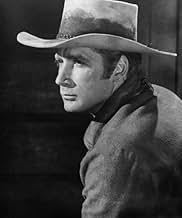NOTE IMDb
6,1/10
2,3 k
MA NOTE
Ajouter une intrigue dans votre langueOn the stagecoach to Cheyenne, a mixed group of passengers must work together to survive the arduous journey and the Indian attacks.On the stagecoach to Cheyenne, a mixed group of passengers must work together to survive the arduous journey and the Indian attacks.On the stagecoach to Cheyenne, a mixed group of passengers must work together to survive the arduous journey and the Indian attacks.
Mike Connors
- Hatfield
- (as Michael Connors)
Robert Cummings
- Henry Gatewood
- (as Bob Cummings)
Histoire
Le saviez-vous
- AnecdotesThe artist Norman Rockwell, famous for his Saturday Evening Post covers, appears as a "townsman" in a brief scene. He also designed the movie's poster, and the character images shown over the end credits.
- GaffesWhen they stop to rest the horses and the Stars are talking, in the background a bus or van appears and drives through a fence gate on a dirt road.
- Citations
Doc Josiah Boone: You see, my dear, you and I are both victims of a disease called social prejudice. Makes no allowance for beauty, wit, or a previous service.
- Crédits fousThe closing credits list the cast as painted by Norman Rockwell
- ConnexionsReferenced in Adam Adamant Lives!: A Vintage Year for Scoundrels (1966)
- Bandes originalesStagecoach Theme (I Will Follow)
(uncredited)
Music by Jerry Goldsmith
Lyrics by Ruth Batchelor
Orchestrated by Harry Betts
Vocal arrangement by Bill Brown
Performed by the Bill Brown Singers
Commentaire à la une
The original version of this story (made in that year of years, 1939) stands as one of the all time great westerns for many people. Therefore, a remake can only hope to come close to the original's heights and, in this case, it doesn't quite make it. The fairly straightforward story of nine people en route to Cheyenne, Wyoming (in the title mode of transportation) during an Indian uprising isn't exactly monumentally meaningful or complex. It would seem hard to mess it up too badly and this version is OK. It just isn't able to shine as brightly as its predecessor. Boozy doctor Crosby and baby-voiced, skyscraper-haired saloon girl Ann-Margret are driven out of town (after two men, literally, kill themselves trying to dance with her!) They join slick gambler Connors, liquor salesman Buttons, sticky-fingered banker Cummings and pregnant soldier's wife Powers on the coach. Fretful Pickens and determined Marshall Heflin ride on top, eventually picking up Cord along the way. On the plus side, there is some gorgeous scenery, lots of great music, the legendary Norman Rockwell portraits of the cast at the end and good performances from Crosby, Buttons and Pickens. Detriments would have to include the lackluster work of Connors (walking through and never fully realizing his part), Powers (mostly blank and uninteresting) and Cord (alternately wooden and over-dramatic.) Cord (what? was Michael Parks busy?), in particular, is a let down in that he lacks the physical presence to really stand out as the hero of the story. Most of the cast can hardly get a close-up in since so many are devoted to Ann-Margret (who, at 25, was already getting the gauzy, fuzzy treatment in them.) She does an adequate job throughout, though she really only sparkles in her catty scene with Powers when the coach is delayed by a fallen tree. There are certainly worse westerns out there, but this can't begin to approach greatness. Too many of the actors are just marking time and the direction isn't particularly creative. Also, what was revolutionary and trend-setting in 1939 was already becoming cliché by 1966, so the whole thing comes off as a little reheated.
- Poseidon-3
- 7 juin 2004
- Permalien
Meilleurs choix
Connectez-vous pour évaluer et suivre la liste de favoris afin de recevoir des recommandations personnalisées
- How long is Stagecoach?Alimenté par Alexa
Détails
Box-office
- Budget
- 3 500 000 $US (estimé)
Contribuer à cette page
Suggérer une modification ou ajouter du contenu manquant

Lacune principale
What is the French language plot outline for La Diligence vers l'Ouest (1966)?
Répondre


















